Sohrab Modi's Period Film "Mirza Ghalib" is Masterly Production
28 Sep, 2023 | Archival Reproductions by Cinemaazi
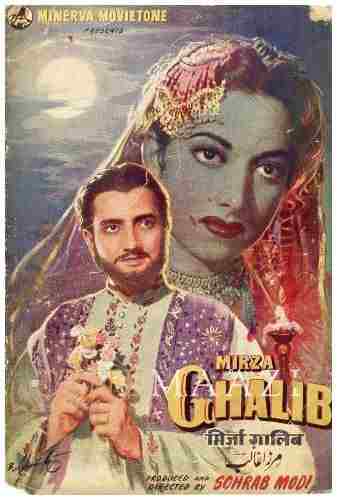
Subscribe to read full article
This section is for paid subscribers only. Our subscription is only $37/- for one full year.
You get unlimited access to all paid section and features on the website with this subscription.
Not ready for a full subscription?
You can access this article for $2, and have it saved to your account for one year.
Mirza Ghalib (1954)
|
Produced and directed by
|
|
|
Dialogue
|
|
|
Lyrics
|
|
|
Music
|
|
|
Cinematrography
|
|
|
Cast
|
"Mirza Ghalib," Sohrab Modi's eagerly awaited production, was released at a glittering premiere in Bombay on December 10, at the Minerva, Excelsior and Palace cinemas.
Inspired by the tragic romance between the great poet Ghalib and Moti Begum, the dancing girl-whom the poet fondly named Chaudavin - J K Nanda's adaptation of Manto's original story closely follows the pattern of the lives depicted there, the departures from recorded fact being dictated by dramatic considerations and regard for the censors.
Bharat Bhushan plays the title role while Suraiya portrays the feminine lead. They receive excellent support from an all-star cast comprising Nigar Sultana, Ulhas, Durga Khote, Murad, Iftekhar, Mukri and Baij Sharma, while veteran actor Jagdish Sethi appears as a guest artist.
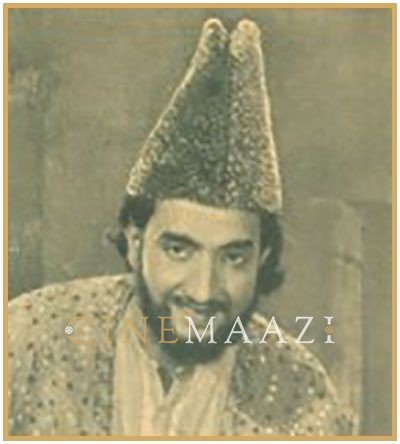
Directed and produced by Modi on his usual lavish scale, the film magically re-creates the poignant love story of the Poet and the Dancer in the atmosphere of the magnificent court of the last of the Moghul emperors. He has with deftness preserved the atmosphere of the times and those aspects of life which inspired the wistful ghazals of Ghalib.
The film sympathetically depicts the torments suffered by the poet in his love for two women. Torn between his sense of duty towards his lovely wife Umrao Begum, and his love for Chaudavin, his troubles and frustrations increase and assume the proportions of tragedy.
Sohrab Modi's direction is unquestionably inspired. Not only has he re-created the world of the Moghuls, but has paid due tribute to the poet in a film which is as warm and dignified as the story it tells. Ghalib's exquisite ghazals and couplets have been admirably incorporated into the narrative and they richly embellish an already masterly production.
Bharat Bhushan is superb as the poet, Ghalib. Enacting his role with quiet restraint and dignity, he presents both the genius of Ghalib the poet, as well as his shortcomings as a man.

Suraiya beautifully brings to life the fascinating Chaudavin, drawing every ounce of sympathy through the character she portrays. The skill she displays in her rendering of Ghalib's exquisite ghazals together with the flexibility of her voice enables her to reach the depths of meaning in the poet's words and draw out their subtlety to the full.
Nigar Sultana as Umrao Begum and Durga Khote as Chaudavin's mother are both in their character roles, while Brij Sharma as Fiddan the opium-eater turns in a noteworthy performance.
Ulhas, the villain of the piece, is convincingly evil and lecherous, Iftekhar with regal dignity almost instinctively lives his part of the Emperor, Bahadur Shah, and Mukri contributes a fine cameo of the self-important but kindly money-lender.
Rajinder Singh Bedi's expressive dialogue registers much of the elegance of speech characteristic of Moghul times. Ghulam Mohammad's music and Shakeel Badayuni's lyrics give further evidence of their creative talents.
With delightful grace, Roshan Kumari and Kumkum present the spectacular dances directed by Lachhu Maharaj and Badri Prasad.
Production values of costume, sets and decor constitute spectacular additions to the film which also has excellent photography.
This article was published in Filmfare magazine’s January 7, 1955 edition as a part of 'Filmfare Reviews'.
About the Author
Other Articles by Cinemaazi
29 Aug,2025
हमें तो विछड़ना ही था...Shailendra
23 Jul,2025
Lalita Lajmi on Guru Dutt: Unfinished Symphony
17 Jul,2025
Guru Dutt: The "Typical Hero" Tag Doesn't Fit
11 Jul,2025
Film in Retrospect: Images Images
08 Jul,2025
Hamlet of Films - Guru Dutt
05 Jul,2025
Khuda, Maut aur Ghulam... Guru Dutt
25 Jun,2025
नई शैली निराला संगीत - R D Burman
25 May,2025
आर्यसमाजी अध्यापक का बेटा, मैं... Dharmendra
17 Feb,2024
What is a Good Documentary Film?
25 Jan,2024
Salute to an Immortal Spirit
22 Jan,2024
A Painful Parting
29 Nov,2023
Children's Film Society
28 Oct,2023
Let's Give the Kids a Chance
26 Oct,2023
Directing the Child Actor
25 Oct,2023
Chandu - The Elephant Boy
23 Oct,2023
HEROISM-Children's Film Society gives the lead
18 Oct,2023
Munna
29 Sep,2023
ख्वाजा अहमद अब्बास का पत्र महात्मा गांधी के नाम
02 Sep,2023
Shakti Kapoor: It's Three Punches A Day
04 Jul,2023
Should a Filmmaker be Original?
24 Jun,2023
Babita My First Screen Love
22 Jun,2023
Phir Wohi Dil Laya Hoon
19 Jun,2023
Romance in Our Cinema
12 Jun,2023
The Romance of our Show Houses
12 Jun,2023
Kashmir Ki Kali (1964)
07 Jun,2023
Sangam (1964)
05 Jun,2023
This thing called Love
25 May,2023
Gandhi: Whose voice?
15 May,2023
"Deewar" Becomes a Nation's Prayer
15 May,2023
Mangal Pandey
06 May,2023
History of Cinema, History of the Nation
02 May,2023
Birbal Paristan Mein
20 Apr,2023
Reincarnation... the story goes on ever after
27 Mar,2023
The Film Director?
21 Mar,2023
M Sadiq
15 Mar,2023
The Social Role of the Cinema
15 Mar,2023
"Samaj" A Memorable Film with Popular Appeal
01 Mar,2023
"Two Eyes" in Hollywood
20 Feb,2023
Do Dooni Chaar
15 Feb,2023
Rafoo Chakkar
07 Feb,2023
Johnny Walker.... still going strong
20 Jan,2023
Mahabharat : Epic Tamasha
10 Jan,2023
Narsi Bhagat : An Excellent Biography
03 Jan,2023
Nav Ratri
01 Dec,2022
एक ताजगी का नाम है देवानन्द (Dev Anand)
25 Nov,2022
जे बी एच वाडिया (J B H Wadia) - वचन न जाए
14 Nov,2022
Children's Films in India
01 Sep,2022
Horses .... Cars and Laughs-Mehmood
06 Aug,2022
हिन्दी फिल्मों की दुर्दशा का जिम्मेदार कौन?
01 Aug,2022
क्या हिंदी फिल्मों से हास्य गायब हो रहा है?
20 Jul,2022
हास्य की परंपरा और हास्य अभिनेताओं की भूमिका
12 Jul,2022
प्राण और उनकी दाढ़ियाँ
17 Feb,2022
Odds Against a New Comer
10 Dec,2021
Speaking of Portraits and People
03 Nov,2021
An Actor Prepares
19 Oct,2021
Producers' War on Dubbed Films
24 Aug,2021
Jottings from a Film Director's Notebook
26 Jul,2021
प्रेमचंद सत्यजीत राय और ’सद्गति’ -गिरिजाशंकर
22 Jul,2021
Rewind 1990 Commerce of Love Stories
20 Jul,2021
Eastern Scene: Cinema of Surviving Faith
22 Jun,2021
Movie Memories : Tansen (1943)
22 Jun,2021
Movie Memories: Sikandar (1941)
15 Jun,2021
Towards A Brighter Future- Bengali Cinema
20 May,2021
The Enigma Of A Flux - Malayalam Cinema
05 May,2021
The seesaw graph of Hindi filmdom
03 May,2021
Ankahee: The Unspoken
29 Apr,2021
The Mahatma Returns: World Press Reaction
29 Apr,2021
Children’s Films
17 Apr,2021
Telugu Cinema in 1986- Sons and Fathers
09 Apr,2021
Mukhamukham : Face to Face
08 Apr,2021
Tarang : Wages and Profits
01 Apr,2021
Design In Indian Cinema
27 Mar,2021
Movie Memories : Savkari Pash
23 Mar,2021
Double Trouble: Role of Twins In Hindi Cinema
22 Mar,2021
Prem Chopra: The Same Role For Ever
19 Mar,2021
Kalyan Kumar - Karnataka’s Self-Made Star
18 Mar,2021
Ceylon's Cyclonic Cinema
18 Mar,2021
Movie Memories : Aladdin & the Wonderful Lamp
17 Mar,2021
Kumari Padmini: Rising New Star Of The South
11 Mar,2021
50 YEARS OF MALAYALAM CINEMA
02 Mar,2021
Alakh Niranjan: Film India Review
27 Feb,2021
Party: The Story of Choices
26 Feb,2021
The Naushad Era In Hindi Film Music
19 Feb,2021
A Man: Amitabh Bachchan -Amitabh, is My Name
10 Feb,2021
A Man: Amitabh Bachchan - Two of a Kind
29 Jan,2021
Women In Hindi Films : Dichotomy of Values
22 Jan,2021
A Man: Amitabh Bachchan - Yesterday and Tomorrow
22 Jan,2021
Cinema in the South: Crisis of Character
18 Jan,2021
Film Societies Play Their Part
01 Jan,2021
Nutan : A Flashback - The Actress
30 Dec,2020
"Gwalan" Proves A Thrilling Entertainment !
29 Dec,2020
Rajesh Khanna : Echoes Of An Era- Family Of Four
28 Dec,2020
Holi: A Metaphor for Horizontal Violence
23 Dec,2020
A Summon for Mohan Joshi
22 Dec,2020
Nutan : A Flashback - The Friend
22 Dec,2020
Raj Kapoor Scores Personal Triumph In “Aag”!
19 Dec,2020
Smita Patil's Memoir- Trading Places
17 Dec,2020
Shashi Kapoor: Once Upon A Time- The Film Makers
16 Dec,2020
Rajesh Khanna : Echoes Of An Era- Peer Pressures
15 Dec,2020
“Lal Haveli”- Crude But Entertaining!
12 Dec,2020
Nutan : A Flashback - The Wife
10 Dec,2020
Rajesh Khanna : Echoes Of An Era
09 Dec,2020
"Lalkar" Presents Cheap Entertainment
07 Dec,2020
Smita Patil's Memoir-Comrades In Arms
01 Dec,2020
Shashi Kapoor: Once Upon A Time- Unjinxed
28 Nov,2020
Ek Din Ka Sultan- Becomes Good Entertainer !
26 Nov,2020
Smita Patil's Memoir- Friendly Strokes
25 Nov,2020
Shashi Kapoor: Once Upon A Time- Tough Times
07 Nov,2020
The Technician And His Problems
06 Nov,2020
We Must Inject Dynamism Into Publicity
05 Nov,2020
The Role Of Film Finance Corporation
04 Nov,2020
Progress In Raw Film
30 Oct,2020
Freedom In Films
28 Oct,2020
Export Market For Indian Films
23 Oct,2020
The Growth of The Motion Picture
22 Oct,2020
Setup Of The Film Industry
21 Oct,2020
Few Facts About Film Production
13 Oct,2020
Personalisation In Cinema
08 Oct,2020
Waiting for a Doyen's Glance- Arati Bhattacharya
08 Oct,2020
कौन सुनेगा इन सिसकती बिलखती प्रतिभाओं का विलाप?
06 Oct,2020
Asrani - Laugh And The World Laughs With You
05 Oct,2020
My Memorable Roles- Hiralal
03 Oct,2020
राजीव गोस्वामी - कहां थे अब तक 'पेंटर बाबू'?
03 Oct,2020
जब नफरत से बेड़ा पार हो गया: बलराज साहनी
30 Sep,2020
The Case of Emotional Turmoil In Dopatta (1952)
29 Sep,2020
The Story Of A Child Artiste - Sheela Kashimiri
26 Sep,2020
Afsana Likh Rahi Hoon : Tun Tun
26 Sep,2020
Some Hopes For The New Year: Lillian
24 Sep,2020
Joru Ka Bhai: A Tale of 'Atithi Tum Kab Jaoge'
22 Sep,2020
अभिनेता प्रेमअदीब से भेंट
21 Sep,2020
Vijaylaxmi: A Career As The 'Other' Woman
18 Sep,2020
Shaminder: The Actor Who Had High Hopes
16 Sep,2020
धर्मेन्द्र - समय आ रहा है...
14 Sep,2020
Film Life After Fifty : Motilal
14 Sep,2020
प्रसिद्ध फिल्म लेखक गुलशन नंदा से आपकी बातचीत
11 Sep,2020
"I live on hope"- Kumkum
11 Sep,2020
Thehr Zara O Jane Wale : Madhubala Jhaveri
09 Sep,2020
Ratnamala Attracts Attention In ‘Station Master’
08 Sep,2020
Ghory: The Laurel Of Indian Cinema's Comedy Duo
07 Sep,2020
Yeh Teri Saadgi, Yeh Tera Baankpan: Usha Khanna
07 Sep,2020
सेनापति शेट्टी
05 Sep,2020
कृतिदेव यहां मैं, तनूजा, स्वीकार करती हूँ
05 Sep,2020
मै उर्मिला को भूल नहीं पाती - मंजरी
04 Sep,2020
बुलबुल बंगाल की: चंद्राणी मुखर्जी
03 Sep,2020
Payyal's Lucky Break
02 Sep,2020
These Foreign Producers
29 Aug,2020
The Practical Actress: Shabnam
29 Aug,2020
“Amrit” Becomes A First Class Picture
28 Aug,2020
फिल्मी मारपीट के गुरू : अजीम भाई
26 Aug,2020
From Poverty to Screen Fame - Mehboob Khan
26 Aug,2020
Humility: Nasreen's Most Admirable Feature
24 Aug,2020
A Mercenary Comes To India - Bob Christo
23 Aug,2020
Dilip Kumar: The Leader
19 Aug,2020
Alam Ara: Ardeshir Irani's Ambitious Secret
17 Aug,2020
I Serve My Art- Kanan Devi
10 Jul,2020



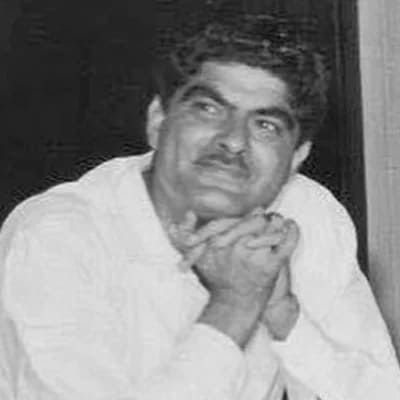
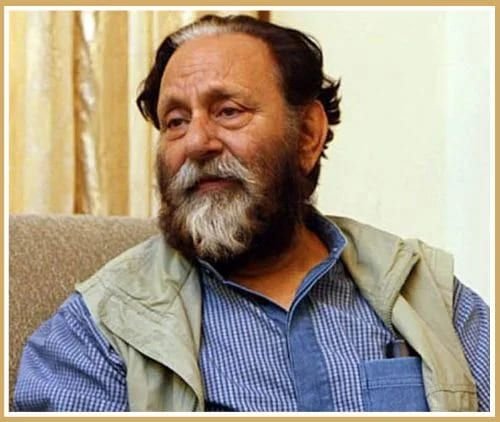
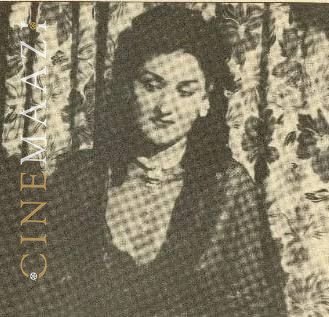
.jpg)



